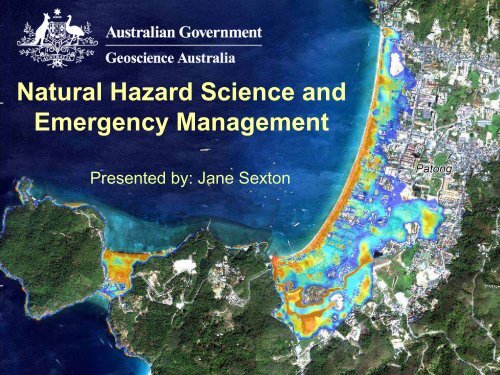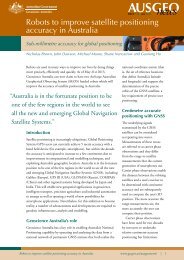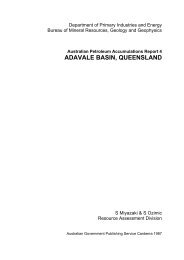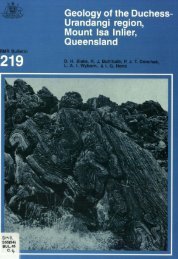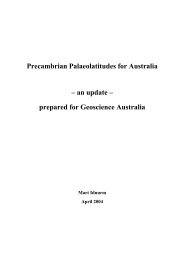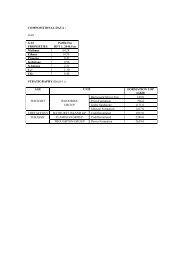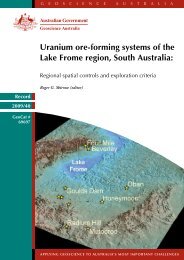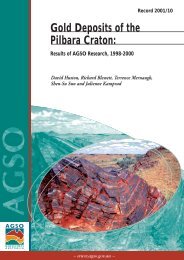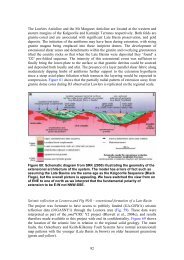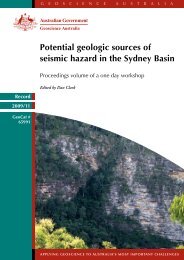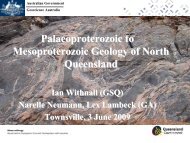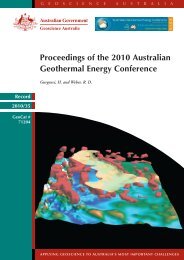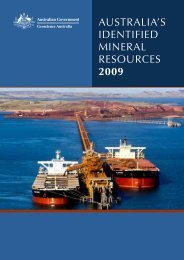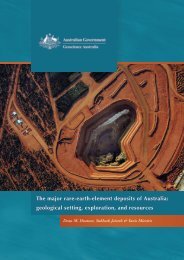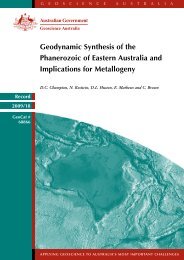Natural Hazard Science and Emergency Management - Geoscience ...
Natural Hazard Science and Emergency Management - Geoscience ...
Natural Hazard Science and Emergency Management - Geoscience ...
Create successful ePaper yourself
Turn your PDF publications into a flip-book with our unique Google optimized e-Paper software.
<strong>Natural</strong> <strong>Hazard</strong> <strong>Science</strong> <strong>and</strong><br />
<strong>Emergency</strong> <strong>Management</strong><br />
Presented by: Jane Sexton<br />
National <strong>Science</strong> Week 18 th August 2009
A bit about Australia<br />
• Population of 20.5 million<br />
• Highly urbanised (92%), 85% live within 50km of coast<br />
• <strong>Natural</strong> hazards:<br />
–Bushfire<br />
– Flood<br />
– Tropical Cyclone<br />
– Severe storm<br />
• hail, tornado<br />
– Earthquake<br />
– Tsunami<br />
– L<strong>and</strong>slide<br />
National <strong>Science</strong> Week 18 th August 2009
<strong>Natural</strong> disasters in Australia<br />
• Cyclone Tracy (1974)<br />
– 65 died, 25000 evacuated by air, 70% homes<br />
destroyed, $800 million in 1974<br />
• Townsville & Katherine Floods (1998)<br />
– 5 died, 7000 houses destroyed, US$280 million<br />
• Ash Wednesday Bushfires (1983)<br />
– 75 died, 2500 homes destroyed, $400 million in<br />
1974<br />
• Newcastle Earthquake (1989)<br />
– 13 died, 130 injured, $4 billion<br />
National <strong>Science</strong> Week 18 th August 2009
<strong>Natural</strong> disasters in Australia<br />
• Meckering Earthquake (1968)<br />
– 6.9 magnitude, town destroyed<br />
• Thredbo L<strong>and</strong>slide (1997)<br />
– 18 died, high profile rescue<br />
• Sydney Hailstorm (1999)<br />
– 35000 buildings suffered serious roof damage, $1<br />
billion damage<br />
• Canberra Bushfires (2003)<br />
– 4 died, 480 homes destroyed, $500 million<br />
National <strong>Science</strong> Week 18 th August 2009
The <strong>Natural</strong> <strong>Hazard</strong>s <strong>Management</strong> Community<br />
• <strong>Emergency</strong> Services<br />
– ambulance, fire, police, military<br />
• Volunteer Response agencies - SES, CFA<br />
• Federal Government<br />
– Funding, Technical Advice, Service Delivery<br />
• State Government<br />
– Planning, Community Services<br />
– Health, Welfare<br />
• Local Government<br />
– Social workers<br />
• Geoscientists, Engineers<br />
• Psychologists, Sociologists<br />
• Local communities & interest groups<br />
National <strong>Science</strong> Week 18 th August 2009<br />
<strong>Geoscience</strong> Australia
Risk Methodology<br />
Time<br />
Change<br />
$<br />
Employment<br />
Gross Regional<br />
Product<br />
<strong>Hazard</strong><br />
Exposure Vulnerability Impact<br />
National <strong>Science</strong> Week 18 th August 2009
Risk Methodology<br />
Time<br />
Change<br />
$<br />
Employment<br />
Gross Regional<br />
Product<br />
Simulate<br />
An<br />
Earthquake<br />
Exposure Vulnerability Impact<br />
National <strong>Science</strong> Week 18 th August 2009
Risk Methodology<br />
Probability<br />
Impact<br />
Simulate<br />
“All”<br />
Earthquakes<br />
Exposure Vulnerability Risk<br />
National <strong>Science</strong> Week 18 th August 2009
Case Study<br />
• Underst<strong>and</strong>ing tsunami risk to Australia<br />
National <strong>Science</strong> Week 18 th August 2009
Historic Tsunami in Australia<br />
National <strong>Science</strong> Week 18 th August 2009<br />
Steep Point (2006): largest reported<br />
tsunami run-up in Australia (8 m)
Tsunami risk assessment for<br />
Western Australia - collaboration with<br />
Fire <strong>and</strong> <strong>Emergency</strong> Services Authority<br />
What is the point of a warning if you don’t have a plan<br />
What is the relative tsunami risk to the Western Australia coastline<br />
National <strong>Science</strong> Week 18 th August 2009
What do<br />
emergency managers<br />
want to know<br />
How often do tsunami occur<br />
What is the maximum<br />
credible tsunami<br />
National <strong>Science</strong> Week 18 th August 2009
Tsunami Risk in WA<br />
• Select three “worst-case” events<br />
• These are large magnitude events generated off Java<br />
(magnitude 9.0 <strong>and</strong> 9.3) <strong>and</strong> Sumba (magnitude 9.1)<br />
National <strong>Science</strong> Week 18 th August 2009
What do<br />
emergency managers<br />
want to know<br />
How often do tsunami occur<br />
What is the maximum<br />
credible tsunami<br />
What is the time to impact<br />
National <strong>Science</strong> Week 18 th August 2009
3.7<br />
Arrival times in hours:<br />
3.5<br />
3.5<br />
2.8<br />
2.8<br />
4.2<br />
National <strong>Science</strong> Week 18 th August 2009
What do<br />
emergency managers<br />
want to know<br />
How often do tsunami occur<br />
What is the maximum<br />
credible tsunami<br />
What is the time to impact<br />
What are the onshore impacts<br />
– inundation extent<br />
– people<br />
– built environment<br />
National <strong>Science</strong> Week 18 th August 2009
GIS Decision Support Tool<br />
National <strong>Science</strong> Week 18 th August 2009
Tsunami Impact Assessment<br />
National Exposure Information System<br />
(NEXIS)<br />
+<br />
= Estimates of<br />
Number of houses affected<br />
Number of people affected<br />
National <strong>Science</strong> Week 18 th August 2009
National <strong>Science</strong> Week 18 th August 2009
Impact on inundation results<br />
National <strong>Science</strong> Week 18 th August 2009
In Summary<br />
• Significant benefit in using models to support<br />
natural hazard management<br />
• Developing tools for stakeholders to assist<br />
decision making<br />
• Requires consultation <strong>and</strong> collaboration<br />
• Lot of work to still be done<br />
National <strong>Science</strong> Week 18 th August 2009
Questions<br />
• More information:<br />
http://www.ga.gov.au/hazards/<br />
National <strong>Science</strong> Week 18 th August 2009


